RIGHT TURN ONLY!!
MmmBobobop
by Carlo Santos,

So, the United States gets Morning Musume, and France gets AKB48.
I'm sure there is a deeper meaning to all this.
BOBOBO-BO BO-BOBO
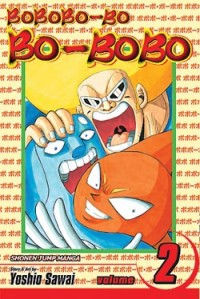
Vol. 2
(by Yoshio Sawai, Viz Media, $7.99)
FROM THE BACK COVER:
"In the year 300X, the cruel Emperor Tsuru Tsururina has mandated hunting down all hair in the Maruhage Empire. But a single man rises to the occasion and takes a stand against this violation of human hair rights. Bo-bobo, master of Fist of the Nose Hair, uses the prehensile hairs of his schnoz to most lethal ends. Follow Bo-bobo and his sentient sidekick snacks as they lead their 'hair'-larious rebellion against the Empire.
Bo-bobo and his 'hair-em' are going all out against the hair haters that are trying to cut, trim, snip, shave, buzz and otherwise mess with our heroes. Prepare to have your mind bent, curled, kinked, permed, crimped and teased by this new volume."
EVIDENCE FOR:
After the nonsensical antics of Bobobo's first volume, the second installment follows up with ... even more nonsense! And here is where we really start seeing Yoshi Sawai gleefully mocking the conventions of shounen fight manga: the villain powering up to his "final form" (with unbelievably bad hair), the awakening of fighters from a previous generation (because today's heroes have gotten pathetically soft), and of course, the core concept of Manly Burning Passion—which burns so hot that Bo-bobo and friends die, beat up the King of Hell, and come back to life to defeat the enemy. THAT'S HOW MANLY THEY ARE. Of course, no display of manliness would be complete without a training arc, where the characters' personalities truly shine—poop-headed Softon gaining his powers from a toilet, Jelly Jiggler leveling up from his anger over the shutdown of the "Nu" store, even Bo-bobo getting pumped after a visit to the supermarket. Sawai even shows some visual flourishes as he parodies famous works of art in the battle against art conoisseur Lord Giga—because, hey, in the nose-hair-fighting world, anything goes. Literally.
EVIDENCE AGAINST:
If there was a guidebook on how to parody the shounen genre, "do it the same as the real thing, except intentionally badly" would probably not be high on the list of recommendations. (Interestingly, lots of webcomic artists apply this same concept to their favorite genres, and they're not very good at it either.) Sawai tries to cover up his lack of comedic talent by ramping up the pace to the point of incomprehension, but having ridiculous attacks where the main heroes even beat up their own guys does not magically become funny just because you're trying to cram 10 panels into each page. Having a worthless side character like Beauty constantly popping up in the corner to describe each attack doesn't help, either. Worse yet, the lack of artistic talent needs covering up as well, and littering every scene with speedlines and special effects and random sight gags obviously isn't working. The character designs are barely a step above amateur, the backgrounds even more so (Are they fighting on a bridge? In a shopping district? Middle of nowhere? Who cares?), and the whole thing is just a pain to look at. And that's what the series is as a whole—painful.
FINAL VERDICT:
With the story and the gags going in new directions, it's marginally better than the first, but a C- is still a C- no matter how you look at it.
DOGS
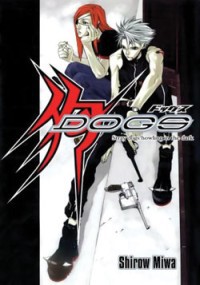
Vol. 0: Prelude
(by Shirow Miwa, Viz Media, $12.99)
FROM THE BACK COVER:
"Mihai, the 'Weepy Old Killer': A former hitman now trying to live a quiet life but haunted by the deaths of his victims and his lover.
Badou, the 'Gun Smoker': A chain-smoking 'information broker' and hired gun whose reckless façade hides a serious intent.
Naoto, the 'Blade Maiden': A preternaturally skilled swordswoman with a single desire: revenge against the assassin who cut down her family.
Heine, the 'Stray Dog': A cipher with a metal collar bolted to his neck, a disturbing talent for mayhem, and a childhood sacrificed to the thing known as 'Kerberos.'
Driven by their ghosts—both dead and alive—and their desire for truth, all are struggling to solve the secrets of the past while surviving the dangerous present—by gun and sword and courage and luck."
EVIDENCE FOR:
If there was ever an manga-ka to raise gunplay to the level of art, it would be Shirow Miwa, whose short stories about four loosely connected characters simply provide the backdrop for mouth-watering eye candy. Not content to go with the usual "person pointing pistol at another person" conventions, Miwa uses bent perspective and striking layouts to dazzle the reader with split-second bullet-time acrobatics. Perhaps most striking of all is how the sparse backgrounds and lack of special effects actually make each scene more effective, as the critical moments in each chapter have more of a "frozen in time" quality than the usual comic-book attempt of capturing motion within a still frame (which is usually a losing battle). And when the gunfire dies down, there's also the varied cast of characters to focus on, whether it be the charms of flighty, fast-talking Badou, or the deep emotional pit in Naoto's heart, or even the ruminations of an old mob guy like Mihai. Because, really, if there's an artist who can craft a manga storyline about an old man who's the very opposite of a spunky teenage protagonist, then anything's possible.
EVIDENCE AGAINST:
Oh, for goodness sakes, not another pompous, preening "_____ with guns" series. Even with the premium page size designed to enhance the art (see also: Black Lagoon), it's hard to find any real substance or artistry when Dogs is just cycling through all the usual tough-guy tropes. Someone trying to avenge her parents' death by becoming a master with a blade? Wow, that's sooooo surprising. Or a mysterious guy with a mysterious superpower caused by a mysterious incident in his childhood? Come on, wake me up when something original happens. (There's even the obligatory priest of questionable moral fiber, and a mute girl with genetically altered wings on her back. Cliché city, folks!) Another part of the problem is that the stories are too loosely connected; it's true the main characters eventually encounter each other, but that's not the same thing as actually kicking off a storyline together. But, if the thematic material is dull and the plotting lacks connectivity, there's still the artwork to drool over, right? Well, maybe if you like barely-sketched backgrounds and the old visual trick of guns pointing at the reader, repeated over and over. Originality? This series does not have it.
FINAL VERDICT:
Pretty to look at, maybe, but it's hard to find any other redeeming qualities in a C+ series of gritty underworld people doing gritty underworld things.
FUTURE DIARY
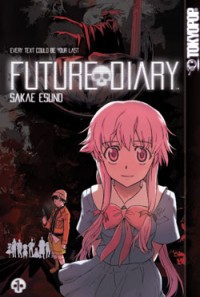
Vol. 1
(by Sakae Esuno, Tokyopop, $10.99)
FROM THE BACK COVER:
"Yukiteru is a lonely student whose only hobby is the daily diary he keeps on his cell phone. But Yukiteru has a secret that nobody knows about ... his cell phone can tell the future! Now a vicious game of survival is about to begin among twelve future diary holders—with the winner crowned god of a new world!"
EVIDENCE FOR:
Imagine a world ... where you told all your pals on Twitter what you were having for breakfast tomorrow morning. Yes, this would be the most annoying thing in the universe, and it's also the idea behind Future Diary, which moves with relentless suspense and action. The idea of seeing into the future has always been a fertile breeding ground for mind-bending plot twists, but where things start really getting interesting is after the revelation that (1) other people have future diaries, (2) only one will remain standing, and (3) each diary tells things from a particular perspective. Yuki, for example, has always blogged about things going on around him, but never himself (thus making him the anti-Twitter?), while lovestruck classmate Yuno only has diary entries about things that happen to Yuki. It's unusual, maybe a bit gimmicky ... but also absolutely riveting once Yuki and Yuno team up to battle the other diary holders. The spiky, stylish art and quick-moving layouts also add to the pace of the story—a story that tells you exactly what happens next, but still makes getting there an unpredictable thrill ride.
EVIDENCE AGAINST:
When do too many plot gimmicks spoil the broth? Maybe when the idea of "seeing into the future" crosses borders with "everyday gadgets that do freaky things" and "elaborately contrived elimination deathmatch," which are all set up by Yuki's imaginary supernatural friend named Deus Ex Machina (oh Sakae Esuno, you must think you're so clever, naming a godlike character after one of the most reviled plot devices in fiction writing). If it weren't for the well-executed action and suspense, this would be rated a lot lower for the obvious attempt to throw everything at the wall and see what sticks. For example, the major enemy in this volume is a goth-loli terrorist who wants to blow up Yuki's school—yes, this is exactly as dumb as it sounds, and yet comes as no surprise given all the other attempts to pander to a very particular audience. The artwork, too, seems overly simplified and sloppy at times, even though it bristles with pent-up energy—the sign of an artist who's good enough to catch your eye, but not quite good enough to impress.
FINAL VERDICT:
Brimming with excitement at every turn, but gets so caught up in genre gimmicks that it drags itself down to a C+ when it really could have been better.
ORANGE PLANET

Vol. 1
(by Haruka Fukushima, Del Rey, $10.99)
FROM THE BACK COVER:
"Like a lot of girls, Rui has boy problems. But most girls would be thrilled to have a problem like hers: There are too many boys in love with her! First there's Taro, the adorable boy next door. Then there's Eisuke, a teaching intern who's just too hot to handle. And finally, Kaoru—the one boy who just may hold the key to Rui's heart!"
EVIDENCE FOR:
Few series can match the youthful vigor of Orange Planet, which is almost gleefully sadistic in the way it runs its heroine through the wringer of romantic embarrassment. Here is the the pubescent love polygon distilled to its purest constituents: the Sweet (childhood friend and next-door neighbor), the Suave (most handsome guy in class), and the Scandalous (good-looking young teacher who's also a big flirt). But laying the elements out there isn't enough: one also needs a catalyst, and sure enough, that's what starts happening when the boys start making their moves. At first it's just standard sitcom antics—Eisuke getting a tad too friendly; Taro stopping by Rui's house at the exact inopportune moment—but when the guys begin competing against each other directly, that's when things start getting awesome. The school library incident really says it all: the guys start bringing out their most extreme cutthroat tactics, and it just goes to show how love makes people do all sorts of funny things.
EVIDENCE AGAINST:
Few series can match the horribleness of Orange Planet, which is at once completely predictable while also being complete nonsense. To understand this contradictory state of affairs, one only needs to read as far as the first chapter, which starts with a cheesy childhood flashback (predictable) and then morphs into this mind-boggling sequence of scene transitions involving Rui, and her friends, and guys, and school, and apartment, and ... ? (Nonsense.) But the most awful thing about the story is how it relies on contrivance after unrealistic contrivance to get its point across. If Rui isn't composing mushy letters to an imagined boy from her past, she's getting naughty with the other guys in such a way that someone her age would probably be grounded for several lifetimes ... if she had any actual parents to ground her. And this is to say nothing of the unbearable art style, which is so cookie-cutter that two major male characters look exactly alike (and this is after very careful research, even comparing the strands of hair poking out of their heads). Throw in the chaotic layouts and general disregard for anatomy, and this clearly a work designed to hurt both the eyes and the brain.
FINAL VERDICT:
Only a lively, competitive rivalry between the guys in the story saves this from total failure. And being just a notch above total failure means something like D-.
REAL
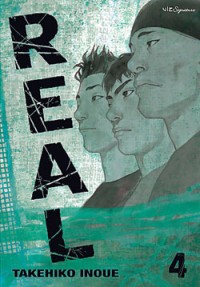
Vol. 4
(by Takehiko Inoue, Viz Media, $12.99)
FROM THE BACK COVER:
"Kiyoharu Togawa is selected to compete for a coveted spot on Japan's National Wheelchair Basketball Team. But with the prospects of this upcoming challenge weighing heavily on his mind, he reflects upon the demons of his past—his battle with cancer and rehabilitation as well as his bitter conflicts with his father. Togawa's passion for the sport is just about the only thing in life that can give him the strength to pull through."
EVIDENCE FOR:
Of all the places for an extended flashback, few would expect it to happen the night before our hero embarks upon the next stage of his quest, but here it is. Opening a window on Togawa's youth turns out to be a smart move, though; he's always seemed like the most well-adjusted character in the series, but this volume proves that it took a lot of struggle to get there. The emotions immediately after Togawa's surgery are grippingly real, almost to the point of hurting: the rage, the despair, the "why me?", the realization that his athletic dreams are over. But the second half of the flashback, where Togawa meets a critical role model and begins to find a new direction in life, is exactly the redemption that's needed after the doom and gloom of the previous chapters. Of course, it's only to be expected that Takehiko Inoue knows exactly what he's doing, moving the story at the right pace to develop the characters fully, as well as bringing out their feelings with delicately shaded artwork and perfectly framed moments. As it turns out, Togawa's flashback begins—and ends—exactly when it needed to.
EVIDENCE AGAINST:
So this is what we're reduced to now—making excuses for flashbacks? Did Inoue-sensei think that after the stunning success of Slam Dunk he could produce whatever he wanted? The series is still wavering about in search of focus, much like one of the other protagonists—school dropout Nomiya basically appears a couple of times this volume but gets nothing done aside from reminding us that he's still around. And Takahashi? Well, he had his moment in the spotlight last volume so he gets to disappear for 200 pages. Is this supposed to be a series about three young men whose lives are intertwined, or is this just the result of having multiple story ideas but not having the time or resources to work on three different series? Thank goodness for Inoue's artistic and storytelling talent, because otherwise this angst-ridden soap opera would have been dropped long ago for its inability to actually keep the plot elements together. Plus the Togawa arc is basically an echo of how Takahashi is feeling right now about losing his leg—so why do it again?
FINAL VERDICT:
This volume still packs enough expressiveness and artistry to pick up a B-, but Real is now officially on notice: start going somewhere with the plot, or else.
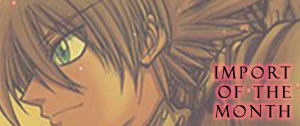
CROSS GAME
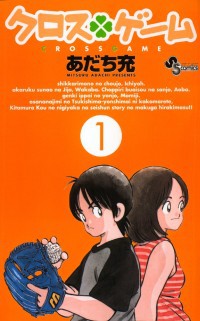
Vols. 1-2
(by Mitsuru Adachi, Shogakukan, ¥390 ea.)
FROM THE BACK COVER:
"The level-headed eldest daughter, Ichiyoh.
The cheerful and honest second daughter, Wakaba.
The rather blunt third daughter, Aoba.
The always energetic fourth daughter, Momiji.
Centered around these childhood friends, the four Tsukishima sisters, the curtain rises on the story of Kou Kitamura's lively youth!"
EVIDENCE FOR:
There is a reason why Japan and Korea's baseball players are the best in the world: because they practice the fundamentals. And practicing the fundamentals is also why Mitsuru Adachi is able to enchant readers decade after decade with heartfelt tales of youth. Right from the start, Cross Game sets things up with a solid core of down-to-earth characters, then glides through a first volume so quietly brilliant that you won't even know an emotional twist is coming until it finally hits in the penultimate chapter. Simply put, it's the slice-of-life genre at its best, and the second volume is only slightly less awesome as it jumps ahead a few years and shows the gradual evolution of Kou's relationship with the Tsukishima sisters as well as his growth as a potential baseball star. A gentle sense of humor also adds some zest to this school-age drama, and the simple yet sure-handed artwork speaks for itself—funny how a few lines symbolizing eyes, nose and mouth, plus masterful backgrounds that instantly describe the passing seasons, can say all that needs to be said about growing up and (possibly) falling in love.
EVIDENCE AGAINST:
Old age might just be starting to catch up to Adachi, who—despite his obvious talents—makes a handful of storytelling goofs through these first two volumes. Was the side story about a highly unrealistic robbery really necessary? Did the first volume really have to pad itself out with a couple of middle chapters about the boys just practicing baseball and whatnot? (The anime did the right thing by condensing it considerably in the first episode.) And why, oh why, must there be all this fourth-wall breakage referencing Adachi's previous works and discussing his incredibly tight weekly schedule and joking about an annoying supporting character? True, a critically acclaimed veteran has probably earned the right to a few self-indulgences, but it still takes the reader out of the story, destroying the illusions of rose-colored youth. But maybe that illusion is part of the problem too, with Kou being too heroic and talented for the average young male to identify with, and his first love being too cute and perfect. Where does one draw the line between realistic ... and overly idealistic?
FINAL VERDICT:
Never mind the shortcomings—Adachi still does it better than almost anyone else, and there's just no matching the pleasant feelings that come from reading this series.
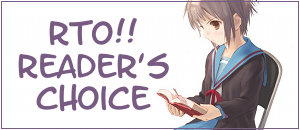
Every now and then, people just want pure eye candy. So, for our next topic, send in your reviews about the manga with the Most Beautiful Artwork! Is it shoujo swirls that do it for you? Or dynamic, hard-hitting action? Or innovators who strive for the abstract? Do tell!
As for our next Guilty Pleasure, this series is the kind that raises all sorts of deep philosophical questions. Why do bad things happen to good people? What are the human limits of love and hate? Why is Hot Gimmick so awful and yet so good? R. Silverman explains.
HOT GIMMICK

(by Miki Aihara, Viz Media, $9.95/9.99 ea.)
As a literature professor who unashamedly counts Pride and Prejudice and Zombies as one of her new favorite books, I really don't have much license to have a guilty manga secret. And yet Miki Aihara's Hot Gimmick sits in two languages on my bedroom shelf, hidden from the eyes of all but the most trusted of visitors.
Hot Gimmick, a grocery-store romance in twelve volumes, follows the misadventures of hapless Hatsumi Narita, who lives with her family in a corporate apartment complex. The place is terrorized by Mrs. Tachibana, a woman who makes Snow White's stepmother look warm and fuzzy. Mrs. Tachibana, of course, has a son Hatsumi's age. Naturally, he terrifies her.
As you might have guessed, the romance between said son (Ryoki) and Hatsumi forms the backbone of the series. As you may not have guessed, there are three other rivals for her affections: smarmy Azusa, nerdy Subaru, and big brother Shinogu. Yes, her brother is a romantic rival. Subaru drops out of the picture pretty early, possibly because he isn't interested in raping and pillaging Hatsumi.
Where other shoujo romances of this ilk would have cute adventures at school festivals, hot springs, and maid cafes, Hot Gimmick ups the ante. Ryoki declares Hatsumi his slave, Azusa has, shall we say, impure motives in his dastardly pursuit of her, and, well, Shinogu is her brother. None of these things would be nearly as awful, however, were Hatsumi a stronger character. She may as well be made of wet cardboard for all the agency she shows. She allows herself to be molested, pushed around, and otherwise abused with the result that the romance feels like a combination of picking the rock over the hard place and Stockholm Syndrome.
But the worst part is that it's really good. Even as you want to simultaneously strangle Hatsumi and lock the rest of the cast up in some sort of Evil Manga Prison, you just can't put the book down. The art is pleasing, the characters wonderful to hate, and unexpected moments of humor save it from being total melodramatic schlock.
All it needs to be perfect brain-candy reading are some zombies.
Is there a hidden gem of manga you'd like to reveal to the world? Is there a piece of garbage that deserves to be bashed in public? Or is there a title that didn't get a fair grade here, and you want to set the record straight?
Now's YOUR chance to be the reviewer! Write a review of about 300-400 words (a little more or less is fine) and include:
- Your name
- Title of manga (and volume no., if applicable)
- Author/Artist
- Publisher
- Briefly describe the story, then explain why this manga is great, terrible, or in between. Be objective, but also be entertaining.
Then send it in to rtoreaders (at) gmail (dot) com. (Plain text preferred.) One review will be selected out of all the submissions and will be published in the next column. All types of manga and manga-inspired comickry are accepted, from past and present, from Japan and beyond—what matters is that it's the Reader's Choice! NOTE: Submissions may be edited for formatting and grammar.
discuss this in the forum (37 posts) |